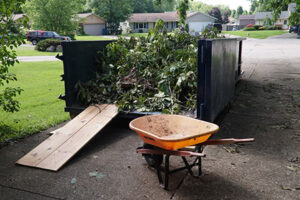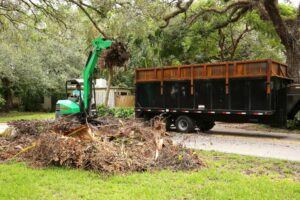Seasonal Yard Debris Cleanup: What to Do in Spring, Summer, Fall, and Winter
Keeping your yard clean throughout the year requires attention to the specific challenges that come with each season. From fallen leaves in autumn to storm debris in winter, seasonal yard maintenance ensures a healthy and attractive outdoor space. By understanding what to expect and how to handle each season’s unique cleanup needs, homeowners can maintain their landscapes efficiently.
Preparing for New Growth in Spring
As winter fades, spring brings new growth and an opportunity to refresh the yard. This is the time to clear out any lingering debris from colder months, including dead leaves, fallen branches, and any remnants of ice damage. Assessing the health of trees and shrubs is essential, as weak or damaged limbs should be trimmed to encourage strong new growth.
Spring is also the perfect season to rake out garden beds and remove any accumulated thatch in lawns. Wet, compacted soil from winter moisture can hinder growth, so aerating the lawn can help promote healthy root development. Mulching flower beds and around trees not only enhances the yard’s appearance but also helps retain moisture and suppress weeds as temperatures rise.
Managing Yard Cleanup in Summer
 Summer brings long days and thriving plants, which means regular upkeep is necessary to prevent the yard from becoming overgrown. Grass clippings from frequent mowing can accumulate, leading to potential thatch buildup. While some clippings can remain on the lawn to decompose naturally, excessive amounts should be removed to prevent smothering the grass.
Summer brings long days and thriving plants, which means regular upkeep is necessary to prevent the yard from becoming overgrown. Grass clippings from frequent mowing can accumulate, leading to potential thatch buildup. While some clippings can remain on the lawn to decompose naturally, excessive amounts should be removed to prevent smothering the grass.
Weeds tend to flourish in the summer heat, requiring persistent attention to keep them under control. Pulling weeds by hand or applying natural weed deterrents can help maintain a tidy landscape. Trees and shrubs should also be monitored for dead or diseased branches that may need pruning. Keeping pathways and garden beds clear of plant debris ensures a well-maintained appearance and reduces the risk of pests and disease.
Summer storms can create additional debris, particularly in areas prone to strong winds or heavy rain. After a storm, inspecting the yard for fallen branches or displaced mulch can help restore order. Proper disposal of yard waste through composting or municipal collection services ensures that organic materials do not become a burden.
Tackling the Heavy Work of Fall Cleanup
Autumn is often the most labor-intensive season for yard debris cleanup, as trees shed leaves and plants begin to go dormant. Leaves accumulating on the ground can create a thick layer that suffocates grass and promotes mold growth. Raking or using a leaf blower helps keep the yard clear while also providing an opportunity to collect organic material for composting.
 As plants prepare for winter, perennials should be trimmed back, and annuals removed to prevent decay from spreading disease. Mulching before the first frost can protect plant roots and keep the soil insulated during the colder months. Gutters should also be checked regularly, as falling leaves and twigs can create blockages that lead to water damage.
As plants prepare for winter, perennials should be trimmed back, and annuals removed to prevent decay from spreading disease. Mulching before the first frost can protect plant roots and keep the soil insulated during the colder months. Gutters should also be checked regularly, as falling leaves and twigs can create blockages that lead to water damage.
Another crucial aspect of fall yard maintenance is preparing trees and shrubs for winter. Wrapping vulnerable plants, particularly young trees, can protect them from harsh winds and frost damage. Storing outdoor furniture and garden tools before the first snow ensures that they remain in good condition for the next season.
Handling Winter Yard Maintenance
Winter yard care primarily involves damage prevention and minimal upkeep. While major cleanup tasks are typically reserved for spring, occasional maintenance can prevent larger problems from developing. Heavy snowfall can weigh down tree branches, leading to breakage. Gently brushing off excess snow can help protect trees, but ice-covered branches should be left alone to avoid further damage.
Storms can also bring fallen branches, which should be cleared as soon as conditions allow. Driveways and pathways should be kept free of snow and ice to ensure safe access. If there is an extended period of mild weather, it may be a good time to inspect trees for signs of disease or damage that could be addressed before spring.
Yard waste is less of a concern in winter, but composting can continue as long as organic material is available. Using winterized compost bins helps break down debris at a slower pace, providing nutrient-rich soil amendments for spring planting.
Maintaining a Clean and Healthy Yard Year-Round
Seasonal yard debris cleanup is an ongoing process that ensures a well-kept and healthy landscape. Each season brings specific challenges, from clearing winter damage to managing summer growth and tackling fall leaf buildup. By staying on top of yard maintenance throughout the year, homeowners can enjoy an outdoor space that remains inviting and beautiful no matter the season. A consistent approach to cleanup also reduces the likelihood of costly repairs or intensive overhauls, making seasonal maintenance a worthwhile investment in the long-term health of any yard.

